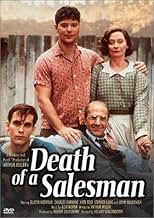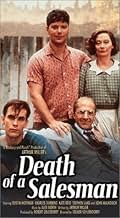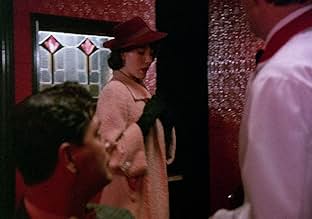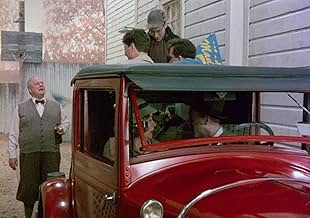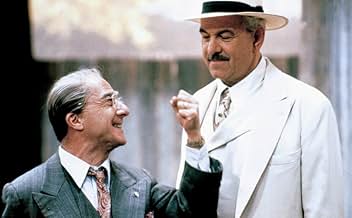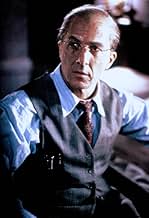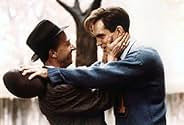An aging traveling salesman recognizes the emptiness of his life and tries to fix it.An aging traveling salesman recognizes the emptiness of his life and tries to fix it.An aging traveling salesman recognizes the emptiness of his life and tries to fix it.
- Won 3 Primetime Emmys
- 7 wins & 12 nominations total
David Chandler
- Bernard
- (as David S. Chandler)
Kathryn Rossetter
- Woman from Boston
- (as Kathy Rossetter)
Featured reviews
'Death of a Salesman' is a well-made, well-told story, but above it's merits as a story, it's the performances by it's actors, Dustin Hoffman & John Malkovich, that stand out & shine the brightest.
'Death of a Salesman' Synopsis: An aging traveling salesman recognizes the emptiness of his life and tries to fix it.
Based on the 1949 play of the same name by Arthur Miller, 'Death of a Salesman' succeeds by becoming an absorbing cinematic tale as well. It efficiently structures the story of an aged man, who is on the verge of killing himself. The Writing Material is engaging & very human, if I may say so. Volker Schlöndorff Directs this story, with maturity.
Hoffman & Malkovich, as mentioned before, stand out with their performances & shine the brightest, they overshadow the narrative, to a large extend. Hoffman is astonishing as an aging traveling salesman, while Malkovich is magnificent as his troubled son. They both deliver legendary, unforgettable performances, that deserve immense praise. Among other performers, Kate Reid does exceedingly well as the wife of the salesman.
On the whole, A story worth watching, with 2 impeccable performances coming in-tact with it.
'Death of a Salesman' Synopsis: An aging traveling salesman recognizes the emptiness of his life and tries to fix it.
Based on the 1949 play of the same name by Arthur Miller, 'Death of a Salesman' succeeds by becoming an absorbing cinematic tale as well. It efficiently structures the story of an aged man, who is on the verge of killing himself. The Writing Material is engaging & very human, if I may say so. Volker Schlöndorff Directs this story, with maturity.
Hoffman & Malkovich, as mentioned before, stand out with their performances & shine the brightest, they overshadow the narrative, to a large extend. Hoffman is astonishing as an aging traveling salesman, while Malkovich is magnificent as his troubled son. They both deliver legendary, unforgettable performances, that deserve immense praise. Among other performers, Kate Reid does exceedingly well as the wife of the salesman.
On the whole, A story worth watching, with 2 impeccable performances coming in-tact with it.
Arthur Miller's compelling work is deftly translated to the small screen here, with riveting performances by Dustin Hoffman as Willy Loman, Kate Reid as Willy's wife Linda, and John Malkovich as the prodigal son Biff. This work touches my soul on several levels: sympathy for the fallen man Willy, understanding of the difficulty of both hating your father and wanting him to be proud of you as Biff shows, and the ever-protective enabler Linda, who defends Willy even as she sees him failing before her eyes. Miller took a simple American family struggling to make life work, and made each character in their own way extraordinary.
I had to read Arthur Miller's Death of a Salesman` for my English class this year. Our teacher was a very industrious woman and let us analyze every character's every word several times, until we couldn't hear the words Willy`, Linda`, Biff`, American Dream` and stockings` any more. It was terrible! She didn't show us any theater or film version, so we began to utterly dislike the text as a whole: a sentimental play where you already know the ending when you read the title.
A few days ago, I spotted Volker Schlöndorff's film version on television, a German dubbed version, but that doesn't matter because I already knew the lines and Schlöndorff hardly changed them.
Fortunately, Schlöndorff didn't make any effort to put his own special style into the movie, he just left the play the way it was and the way, I suppose, Arthur Miller wanted it. So some of you might claim that this version was too stage-drama-like, not cinematic. For me, this was ideal because I could see the REAL, lively Death of a Salesman`, played by an ideal cast: Dustin Hoffman: a little over-acting, but enthusisiastic; Kate Reid: so authentic that she could be taken for my mother; John Malkovich: silent, thoughtful, self-confident`, great! How shall I put it? This film sort of opened my eyes towards this great, merciless work of Arthur Miller. This play is something you can orientate your life to. At many important turning points of your life, you can remember Willy Loman and his fate that is fictitious but and believe me, I know some people who are exactly like him definitely could be the fate of a real person, and not only of an American. I found the Salesman` important, not as much as a criticism of the American Dream but an account of what must happen, if lives are built upon lies lies to others and lies to yourself. Those people who think Death of a Salesman` is rubbish are those who suppress cruel truths just as Willy Loman does.
So, when I saw this movie, I was completely stunned because its hopelessness became clear to me and I noticed how crucial this American classic really is. I give Schlöndorff 8 out of 10 stars because there are some flaws in his way of directing (e. g. letting Malkovich and Lang play their young alter egos was stupid because no one believes that they are 17).
Another sad example how bad teachers can destroy a masterpiece. Shame on you, Mrs. H.!
A few days ago, I spotted Volker Schlöndorff's film version on television, a German dubbed version, but that doesn't matter because I already knew the lines and Schlöndorff hardly changed them.
Fortunately, Schlöndorff didn't make any effort to put his own special style into the movie, he just left the play the way it was and the way, I suppose, Arthur Miller wanted it. So some of you might claim that this version was too stage-drama-like, not cinematic. For me, this was ideal because I could see the REAL, lively Death of a Salesman`, played by an ideal cast: Dustin Hoffman: a little over-acting, but enthusisiastic; Kate Reid: so authentic that she could be taken for my mother; John Malkovich: silent, thoughtful, self-confident`, great! How shall I put it? This film sort of opened my eyes towards this great, merciless work of Arthur Miller. This play is something you can orientate your life to. At many important turning points of your life, you can remember Willy Loman and his fate that is fictitious but and believe me, I know some people who are exactly like him definitely could be the fate of a real person, and not only of an American. I found the Salesman` important, not as much as a criticism of the American Dream but an account of what must happen, if lives are built upon lies lies to others and lies to yourself. Those people who think Death of a Salesman` is rubbish are those who suppress cruel truths just as Willy Loman does.
So, when I saw this movie, I was completely stunned because its hopelessness became clear to me and I noticed how crucial this American classic really is. I give Schlöndorff 8 out of 10 stars because there are some flaws in his way of directing (e. g. letting Malkovich and Lang play their young alter egos was stupid because no one believes that they are 17).
Another sad example how bad teachers can destroy a masterpiece. Shame on you, Mrs. H.!
Superb portrayal of tragic characters. One can sense the futility, frustration, and disappointment of Loman. As we age and our faculties deteriorate along with unrealized dreams, it is easy to grasp for hope even where none exists and transfer our aspirations to the next generation only to have them carry your faults and failings in addition to their own. Profoundly sad but unfortunately that is the reality for countless billions of the human race. 8/10.
Volker Schlondorff's adaptation of Arthur Miller's bed-rock of an American tragedy, Death of a Salesman, is one of the best made-for-TV movies of the 80's (odd how it never got a theatrical release though). It gives the star power of Dustin Hoffman in the iconic role of Willy Loman, and for a great theater actor-turned-screen star (though mostly low-key through his career), John Malkovich, and some fine character acting as well. If you've read the play, you might envision something else entirely, and if you've seen it on stage it might bring more disappointment. It is the sort of play you end up going through whether you want to or not in English class(es), particularly in college. It is an important film to see/play to read when you're around this age bracket, as the struggles of Willy and Biff collide alongside each other, and some kind of catharsis needs to come for both- one who's life has almost gone up in smoke, and one who needs to figure it out.
It's not worth talking about much of the actual plot or story of the film/play, although it is of note that one of the very best (or at least most effective) scenes for me comes when Willy visits Howard at the office. This exchange, and the drama that unfolds, is a truly heart-breaking little moment, among some others in the film, where you see a collision of "old-school" salesmanship and the always now recycling form of BS that goes with the salesman/business world. Really, what's worth talking about is the acting, and certain things with the style, for if you are wanting to check out the film before (or after) seeing the play, it's worth it to know what you'll be in for. In short, Hoffman is quite powerful and true in the film, though in ways that aren't really expectable.
An image from reading the play of Willy (that he might be bigger than life, though perhaps little in the mind, and out of shape) might go against a low-energy actor like Hoffman. But somehow, it seems to work, because there's heart and fire in the performance. Same goes for Malkovich, though on a different level. Their scenes together, or on their own, are like watching pro boxers have a go at each other, old timer versus a new champ; there is one other scene, when Biff catches Willy in the hotel room with his 'lady friend' that is likely one of the best scenes either actor has ever done (even if it's questionable if overall the performances are among their best).
As far as stylistics go, Schlondorff usually does the right thing: let these actors have their way around, and just try to film it without too much getting in the way. He does this, and at the same time is clever with certain camera sweeps and timing in the narrative (Miller's play was one of the first to jump around, like a novel or even a some films). The music by Alex North is one of my least favorite aspects to th film, as it chimes in some emotional cues that aren't right at all (though when it gets to the jazzy 40's style music then it's not bad). This version of Death of a Salesman is definitely recommended by me, but it may not be the absolute definitive version for some.
It's not worth talking about much of the actual plot or story of the film/play, although it is of note that one of the very best (or at least most effective) scenes for me comes when Willy visits Howard at the office. This exchange, and the drama that unfolds, is a truly heart-breaking little moment, among some others in the film, where you see a collision of "old-school" salesmanship and the always now recycling form of BS that goes with the salesman/business world. Really, what's worth talking about is the acting, and certain things with the style, for if you are wanting to check out the film before (or after) seeing the play, it's worth it to know what you'll be in for. In short, Hoffman is quite powerful and true in the film, though in ways that aren't really expectable.
An image from reading the play of Willy (that he might be bigger than life, though perhaps little in the mind, and out of shape) might go against a low-energy actor like Hoffman. But somehow, it seems to work, because there's heart and fire in the performance. Same goes for Malkovich, though on a different level. Their scenes together, or on their own, are like watching pro boxers have a go at each other, old timer versus a new champ; there is one other scene, when Biff catches Willy in the hotel room with his 'lady friend' that is likely one of the best scenes either actor has ever done (even if it's questionable if overall the performances are among their best).
As far as stylistics go, Schlondorff usually does the right thing: let these actors have their way around, and just try to film it without too much getting in the way. He does this, and at the same time is clever with certain camera sweeps and timing in the narrative (Miller's play was one of the first to jump around, like a novel or even a some films). The music by Alex North is one of my least favorite aspects to th film, as it chimes in some emotional cues that aren't right at all (though when it gets to the jazzy 40's style music then it's not bad). This version of Death of a Salesman is definitely recommended by me, but it may not be the absolute definitive version for some.
Did you know
- TriviaDustin Hoffman called this his favorite acting experience.
- GoofsWhen Willy comes out of his flashback in the bathroom of Frank's Chop House, the close up shot shows a drink on the toilet seat. When the shot shifts behind the entering waiter, the drink is gone.
- Quotes
Biff Loman: I run out of that building and I see... the sky. I see all the things I love in this world. The work, the food, the time to sit and smoke. And I look at this pen and I ask myself, "What the hell am I grabbing this thing for? Why am I trying to become something I don't wanna become when all I want is out there waiting for me the minute I say I know who I am?"
- ConnectionsFeatured in American Masters: Arthur Miller: Private Conversations (1985)
Details
- Release date
- Country of origin
- Official site
- Language
- Also known as
- Tod eines Handlungsreisenden
- Filming locations
- Production companies
- See more company credits at IMDbPro
Contribute to this page
Suggest an edit or add missing content


